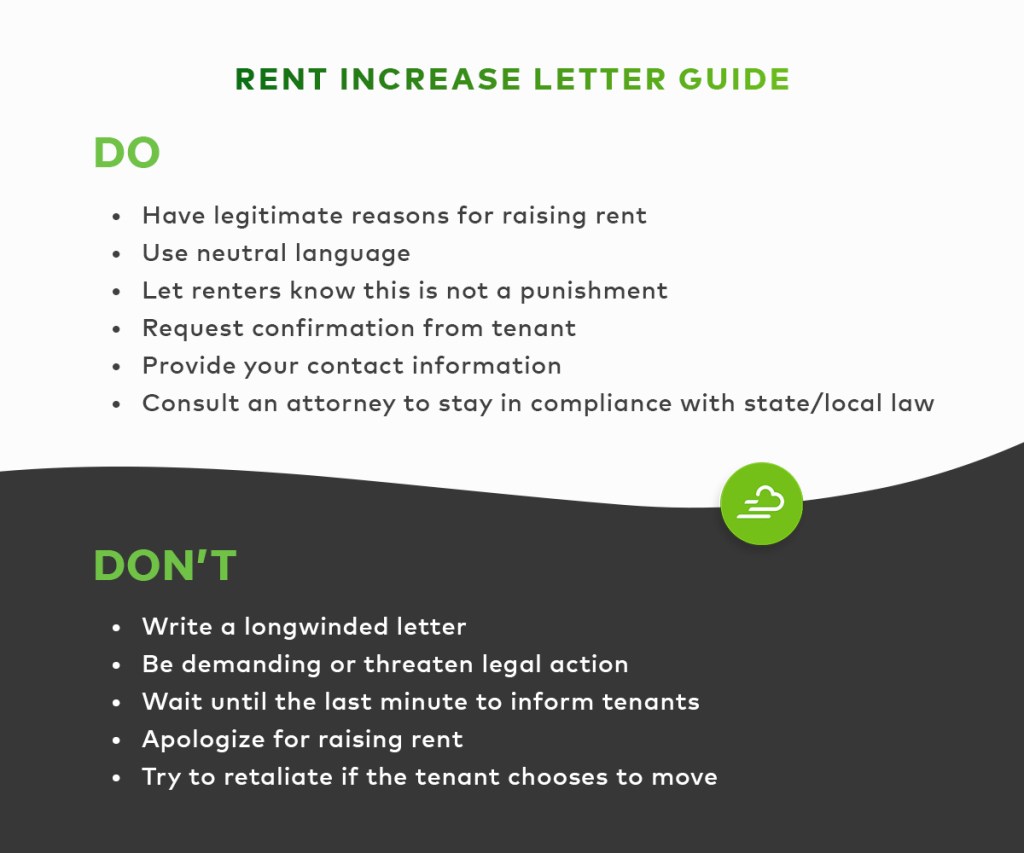
A rent increase letter is a formal written notice that a landlord sends to a tenant to inform them of an upcoming increase in rent. It includes the new rent amount, effective date of the increase and other important details. We’ll show you how to write a rent increase letter and provide you with a free sample notice that you can use as a template.
Key takeaways
- Give tenants plenty of advance notice (more than the legal minimum whenever possible).
- The letter should aim to reduce stress and maintain a positive landlord-tenant relationship.
- Clearly state the new rent amount, the date it takes effect and the reason for the increase.
- Transparency helps tenants accept the change.
- Use a direct, neutral tone. Your language should be polite and professional. Avoid sounding threatening or apologetic.
- Ask the tenant to confirm acceptance in writing. Be sure to explain what happens if they decline.
- Provide your contact information so tenants can reach out with questions.
How do you write a rent increase letter?
Writing a rent increase notice is a routine part of managing rental properties. The process isn’t complicated, but getting the details and the tone right is essential.
Here are the key steps you should follow:
1. Review your state’s notice period laws. Most states require 30-60 days’ notice, but some require more. Check your local laws and always provide written notice well in advance.
2. Explain the reason(s) for the increase. Tenants are more likely to accept an increase if they understand the reason. Common justifications include higher operating costs or property improvements. If possible, mention the benefits they’re going to see as a result. This shows renters the increase isn’t personal.
3. State important information: the date of the letter, tenant’s name, address, current rent, new rent, effective date and timeframe to accept or reject lease renewal.
4. Maintain a neutral, professional tone. Be polite but firm. Feel free to thank them for their tenancy and always avoid threats or emotional language.
5. Ask the tenant to reply in writing that they agree to the new terms. Ideally, they would email their acceptance of the terms.
6. Provide your contact information. Also, tell them the best time and way to reach you. If you suddenly become hard to reach, it might look like you’re avoiding them or just don’t care how they feel.
7. Deliver the notice properly. Hand delivery, certified mail or another verifiable method is often required by law. Always keep a copy for your records.
Do’s & don’ts for writing a rent increase letter
There are right and wrong ways to approach rent increase letters. Here are a few guidelines:
Do’s
- Give a valid reason
- Use neutral language
- Provide ample notice
- Be appreciative of good tenants
- Ask for written confirmation
- Stay accessible
- Check legal compliance
Don’ts
- Write long, wordy letters
- Sound threatening or demanding
- Wait until the last minute
- Apologize for increases
- Take silence for acceptance
- Ignore valid tenant concerns
- Violate rent control or notice laws
Sample rent increase letter template
Below is a template you can copy and adapt to your needs:
Your business name
Address
City, state, zip
Date
Dear valued resident,
This letter serves as notice of our intent to increase the monthly rent at [address] from [$X] to [$X] beginning [date of increase].
After careful consideration, we’ve determined this increase is necessary due to our increased utility and maintenance costs. We are providing this notice well in advance to allow you ample time to plan for this change. You have been great tenants, and we hope you will choose to continue the lease agreement under these new terms.
Please confirm your acceptance of these terms by responding to this email. If you reject the terms of this increase, your current lease will expire on [date].
Sincerely,
Name
Title
Frequently asked questions
How much notice is required?
Most states require at least 30 days’ written notice for a rent increase, but many require 60 days, and a few have special requirements.
For example, California requires 90 days if the increase is more than 10% of the rent. Providing more notice than the legal minimum is often a smart move. Tenants appreciate having time to adjust their budgets or make decisions about renewing.
Property managers who consistently provide last-minute notice risk damaging trust. This may encourage tenants to move out unnecessarily or leave negative online reviews. You demonstrate a winning combination of professionalism and courtesy by giving extra notice.
Is there a cap on rent increases?
In most non-rent-controlled areas, there’s no statutory cap on rent, but market forces generally set the limits.
In rent-controlled states and cities, caps apply. California’s AB 1482 law caps annual increases at 5% plus inflation, up to a maximum of 10%. Oregon has a rent stabilization law that limits increases to 10% in any 12-month period. DHCR rent regulation in New York is even trickier to follow.
Always check your local laws, since violating rent caps can carry significant penalties.
Can tenants refuse a rent increase?
Yes, tenants may decline to renew at the higher rent. If they refuse, it means they will vacate at the end of their current lease term. If they are on a month-to-month lease, they will most likely have to leave by the effective date of the increase. Always make the tenant’s choices clear: accept the new rate or let the lease expire. This transparency helps avoid misunderstandings and sets proper expectations.
What is considered a fair rent increase?
A common benchmark is 3-5% annually. This amount is generally seen as fair by tenants and sustainable by landlords.
Larger increases may be legal and justified in certain circumstances. For instance, if taxes, utilities or maintenance costs have risen or if recent property improvements have raised the unit’s value. Still, sudden large jumps can upset tenants and may lead to high turnover.
How should I deliver a rent increase notice?
The safest method is always written delivery, often via certified mail or personal delivery, depending on local law. No matter the method, always keep a copy of the letter and a record of how it was delivered.
What is the best way to keep a record of my tenant communications?
Your property management software should be able to keep a permanent record of all tenant correspondences. For instance, with Yardi Breeze and Yardi Breeze Premier, all communications are kept securely in the cloud.
If email correspondence is not possible for some reason, request a written response delivered by mail or in person. It isn’t sufficient to keep a note that says you spoke to the tenant and received verbal confirmation.

Disclaimer
Please note that this article does not constitute or replace legal advice. We hope this information is helpful, and we encourage you to do more research. Consult state law and your attorney before raising rent or sending a rent increase notice.



